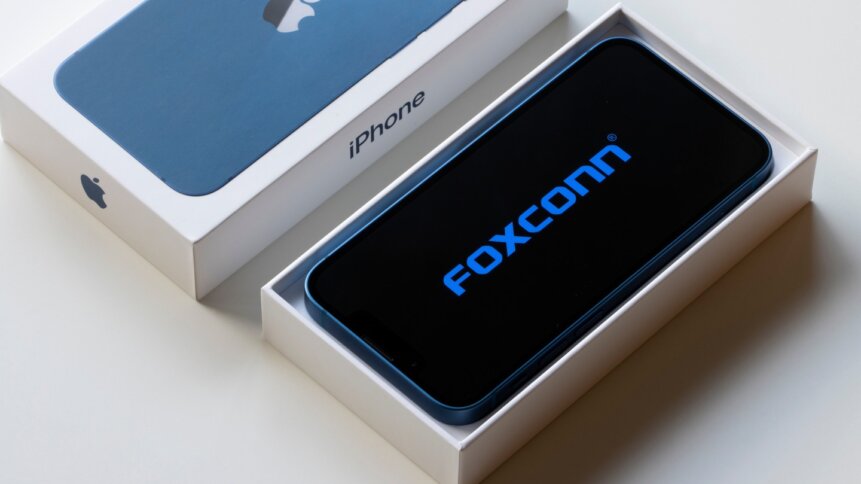Foxconn reported to have signed $700m deal for a new Indian manufacturing plant

|
Getting your Trinity Audio player ready...
|
Foxconn, one of Apple’s chief suppliers for products like the iPhone, may – or may not – have signed a $700m deal for a new Indian manufacturing plant. The uncertainty comes after Foxconn’s chairman and CEO, Young Liu, paid a visit to the country in the first week of March.
Reports immediately after the visit universally landed on the idea that the company had committed to the $700m deal for a new Indian manufacturing plant – and drew the significant conclusion that the move signalled Foxconn’s intention to at least significantly reduce its commitment in China.
Schrodinger’s investment.
Subsequently though, both the $700m figure, and indeed the certainty of a new Indian plant, was countered by a statement by the company, which said that “no definitive agreements” had been signed by Foxconn for an Indian plant.
So as yet, the new Indian Foxconn plant remain something of a “Schrodinger’s investment” – both dead and alive simultaneously, until either confirmed or comprehensively trashed.
In this instance though, there may well be good reason to suppose that the potential plant will come to fruition.
The idea of the $700m investment was reported after the chief minister of Karnataka state, Basavaraj S. Bommai, tweeted on Friday that Apple would “soon” manufacture iPhones at a new plant in the state, creating “about 100,000 jobs.”
Bloomberg meanwhile was the first to pin the price to the plant, reporting a planned new factory in Karnataka, and citing unhelpfully unnamed sources.
The office of the chief minister of Karnataka’s neighboring state, Telangana, then also tweeted that Young Liu – specifically, by name – had signed an agreement on Thursday to “set up electronics manufacturing facilities” in the region.
Have guns been jumped by local officials with twitchy Twitter-fingers, or is the planned plant a reality that Foxconn is simply not ready to acknowledge yet?
Credible history.
Again, at the moment, it’s very much a Schrodinger’s investment, but both Apple and Foxconn have been looking to loosen ties with China since at least last year.
Foxconn is based in Taiwan, a country with an increasingly brittle relationship with China in its own right, given that a) it’s one of the world’s largest semiconductor producing nations, and b) the Chinese government denies its status as an independent nation, regarding it as Chinese territory.
But perhaps more relevant than that, Foxconn owns the Apple plant in Zhengzhou, China, where late in 2022, Covid restrictions – and potentially Covid outbreaks – led to a significant slowdown in production of Apple’s new iPhone 14.
The situation deteriorated as protests mounted over China’s no-Covid policies, which kept workers within the boundaries of the factory. Escape attempts by workers looked like prison breaks, and the Chinese government even put out an advisory to its military veterans to report for work at the Foxconn plant.
Eventually, the situation spread into usually silent protests in other cities across China, and ultimately led to the Chinese government abandoning its no-Covid policies, freeing up the economy to attempt recovery after years of significant restrictions.
Pressure from the US.
That, coupled with some geopolitics on behalf of the United States, could well have made China a less attractive manufacturing option than it has been for decades.
In particular, the Biden administration has been steadily stepping up economic pressure on Chinese firms – and US firms who deal with China – as part of its ongoing commitment to rebalance the semiconductor supply chain more in its own favor, at the expense of China’s historic and current state of market dominance.
Moves like tying Chips Act funding to ten year bans on expansion into particular countries – including China – and growing pressure on companies like Huawei and TikTok owner, ByteDance (with potential bans of both companies being floated in the halls of Washington, DC) have established a growing mood of hostility between the US and China on all kinds of technology.
In addition to which, President Biden’s revolutionary stance on Taiwan – unequivocally asserting that the US will send troops to Taiwan in the event of a Chinese invasion of the semiconductor powerhouse, have arguably raised tension between the two superpowers to new and worrying levels.
2022 moves.
In December, 2022, Apple announced its intention to use more chips made domestically in its Arizona plant, and it has been moving as quickly as it practicable to assure China that it plans to lighten its investment in the country ever since.
Similarly, Foxconn announced back in August, 2022, that it would spend an additional $300m on its factory in North Vietnam, so it’s by no means above pulling major multimillion dollar deals to expand its supply chain. That would seem to add credibility to at least the potential of a new $700m deal to build a plant in India, allowing it to lighten its commitments in China, if probably not to disentangle itself entirely from the superpower entirely as far as its supply chain is concerned.
It’s also worth remembering that both Foxconn and other Taiwanese manufacturers have been building at least some iPhones for Apple in India since 2019, though as yet, the country accounts for less than 5% of Apple’s global manufacturing output.
A new $700m plant might well increase that percentage significantly, though whether it would especially move the needle in terms of Apple’s overall supply chain remains to be seen. Any such plant, if it comes to pass, would likely be more about removing some supply chain capacity from China than necessarily shaking up Apple’s operations to any truly disruptive degree.
It’s also worth noting that Foxconn is eyeing significant moves in the EV market, and that that technology was explicitly mentioned by Young Liu, along with semiconductors, in his summation of his visit to India.
“My trip this week supported Foxconn’s efforts to deepen partnerships… and seek cooperation in new areas, such as semiconductor development and electric vehicles,” he explained.
Will Foxconn’s Schrodinger’s investment in a $700m deal for a new Indian manufacturing plant come good? And what – if anything – will China’s reaction be if it does?










